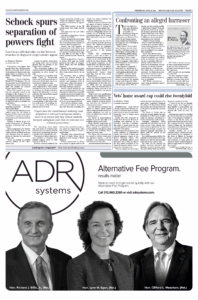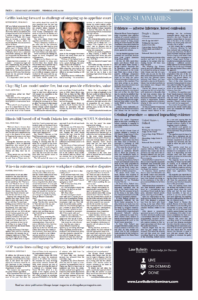Veterans’ home award cap could rise twentyfold

The Chicago Daily Law Bulletin published this piece in print on Wednesday, April 18, 2018. The jump is below.
Published by the Chicago Daily Law Bulletin on April 18, 2018
By Rebecca Anzel
Law Bulletin correspondent
SPRINGFIELD — In the wake of a deadly Legionnaire’s disease outbreak at a veterans’ home, a Senate panel voted to raise the maximum award for Court of Claims cases twentyfold.
Senate Bill 2481, proposed by Tinley Park Democrat Michael E. Hastings, was approved by the chamber’s Judiciary Committee this week. It would raise the cap currently applied to tort cases from $100,000 to $2 million.
The measure is a response to the deadly outbreak of Legionnaire’s disease that caused 13 deaths and infected numerous others at the Quincy Veterans’ Home. The change specifically affects cases filed since July 1, 2015, the date of the first known outbreak of the Legionella bacteria, which causes a severe form of pneumonia.
“This is a chance to vote for caps and be with the trial lawyers at the same time,” committee chairman Sen. Kwame Y. Raoul joked during the hearing. The Chicago Democrat is his party’s nominee for attorney general.
The Court of Claims has jurisdiction in cases against the state, including the 11 filed by the families suing for damages, according to a Senate Democratic staff analysis.
Hastings’ legislation, which originally eliminated the cap for all types of tort cases, passed committee with an agreement the senator would formally propose the updated language specifying an upper limit for awards on the Senate floor.
In a brief appearance before the committee, he summarized the legislation as a bill that still generally takes aim at the current caps.
He could not be reached for further comment afterward. But Hastings, an Army veteran, earlier this year told the Daily Law Bulletin the push is personal for him.
“I want to see this go through. These people, what happened to their families is unacceptable, and $100,000 is not the value of one person’s life, that’s for sure,” he said.
Hastings also said at the hearing that Senate Republicans requested some of the legislative findings included in the bill be taken out before they would vote for it. Part of that language includes calling the Court of Claims cap “an arbitrary, inequitable, and unjust limit” that is one of the lowest nationwide.
Another section set to be scrapped reads: “Victims and families harmed by the negligence of the State of Illinois in veterans homes, correctional facilities, Illinois roadways, or other places in which the State conducts business deserve equal access to justice under the law.”
In addition to raising the cap to $2 million, the bill leaves in place language exempting cases involving a state-owned vehicle from that limit. It also allows the court to adjust the maximum award to reflect increases in the Consumer Price Index determined by the U.S. Department of Labor.
The measure was approved by the panel without opposition.
State lawmakers from both parties filed five measures since the start of the year that alter the Court of Claims Act in response to the Legionnaire’s outbreak.
They include Senate Bill 3008, which also raises the maximum award to $2 million but removes the exception for cases involving state-owned vehicles; Senate Bill 2434, which removes any sort of cap for cases involving the death of a resident of a veterans’ home; House Bill 4534, which is a duplicate of the original version of Hastings’ proposal; and House Bill 5171, which is aimed at expediting payouts of $100,000 to the families of veterans who died from Legionnaire’s disease.
Of those bills, only Hastings’ measure has advanced from the committee stage.
Republican Gov. Bruce Rauner’s office has said it’s “open to a conversation” on changing the Court of Claims cap. But in a report sent to legislators last week, the administration pushed back against criticisms its public health department and veterans’ affairs department botched their response to the outbreak, saying it was “quick, coordinated and comprehensive.”
The 35-page report claimed, among other things, that the disease is tough to diagnose, that the number of cases around the country is rising and that the administration took decisive action to protect veterans in the home as early as August 2015.
“If Illinois had not taken the quick, coordinated approach that it did in 2015, the number of cases likely would have been much higher,” the report claimed.
The Chicago Daily Law Bulletin originally published this piece online here.

